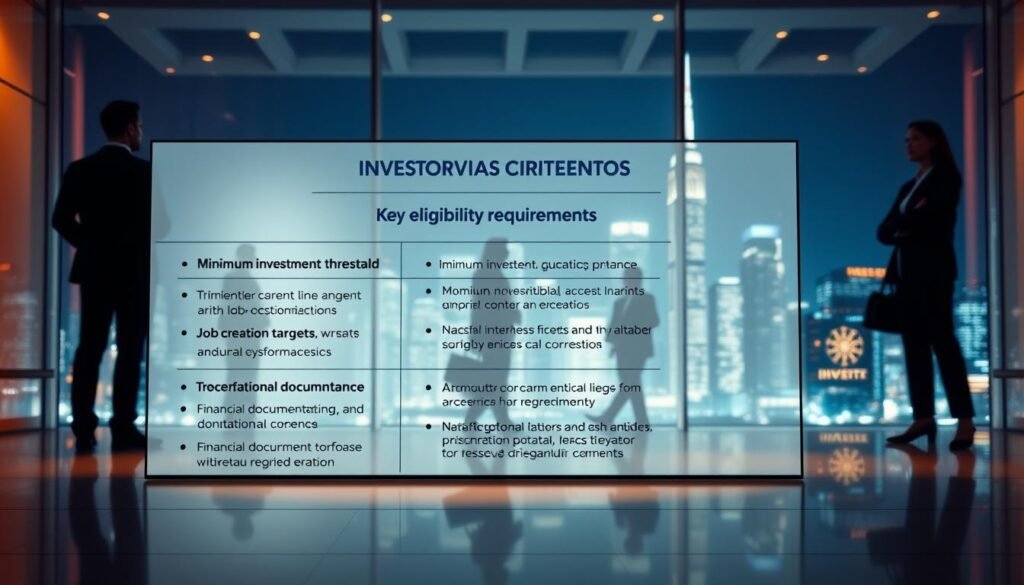Have you ever wondered how successful entrepreneurs and high-level managers expand their operations globally while securing residency in a new country? The answer lies in understanding the visa options available for those looking to invest and establish a presence abroad.
Navigating the immigration process can be complex, but with the right knowledge and guidance, it becomes a manageable and rewarding journey. Whether you’re exploring temporary or permanent routes, programs like the EB-5, E-2, and L-1 visas in the United States offer tailored solutions for executives and entrepreneurs.
These programs not only provide a pathway to residency but also encourage economic growth through job creation and financial investment. By understanding the requirements and benefits, you can make informed decisions that align with your business goals and personal aspirations.
Key Takeaways
- Explore both temporary and permanent visa options for international expansion.
- Compare leading programs like EB-5, E-2, and L-1 for their unique benefits.
- Understand the importance of financial investment and job creation in visa applications.
- Leverage expert guidance to simplify the immigration process.
- Prepare a comprehensive business plan to meet eligibility criteria.
Introduction to Investor Visas and Global Business Opportunities
Global expansion is a key goal for many professionals, and understanding the right visa options can make all the difference. For executives and entrepreneurs, these programs provide a structured pathway to establish operations in new markets while securing legal status abroad.

What Are Investor Visas?
An investor visa is a legal document that allows individuals to enter and stay in a foreign country based on their financial commitment. These programs are designed to encourage economic growth by attracting capital and creating jobs. In the United States, categories like the EB-5, E-2, and L-1 visas are popular choices for business leaders.
To qualify, applicants must meet specific criteria, such as a minimum investment amount and active involvement in the business. For example, the E-2 visa requires at least 50% ownership of the enterprise. These requirements ensure that the investment benefits the local economy.
Why They Matter for Executives and Entrepreneurs
Investor visas are more than just a legal requirement—they are a strategic tool for growth. They enable direct entry into new markets, allowing businesses to expand their operations and create jobs. For families, these programs often include benefits like residency and access to education.
«The right visa can transform a business idea into a thriving international enterprise.»
Compared to other immigration methods, investor visas offer a faster and more reliable route. They also provide long-term stability, as many programs lead to permanent residency. For ambitious leaders, this is a game-changer.
Navigating Investor Visas for Executives Starting Businesses Abroad
Financial investment is the cornerstone of successful global business ventures. To expand operations internationally, aligning capital with immigration goals is essential. This ensures not only legal compliance but also long-term growth and stability.

The Role of Financial Investment in Global Expansion
Securing an investor visa often requires a significant financial commitment. Programs like the U.S. EB-5 and E-2 visas highlight the importance of at-risk investment. For example, the EB-5 program mandates a minimum investment of $800,000 in targeted employment areas.
This capital must be at risk, meaning it cannot be guaranteed. Such requirements ensure that the investment genuinely benefits the local economy. In return, applicants gain access to residency and other benefits.
«A well-planned investment strategy can transform a business idea into a thriving international enterprise.»
Real-world examples show how proper investment supports job creation and company growth. The EB-5 program, for instance, requires the creation of at least 10 full-time jobs. This not only meets visa requirements but also strengthens the local workforce.
Aligning investment amounts with immigration requirements is crucial. Factors like market conditions and business plans play a key role. Understanding both the risks and rewards ensures a smoother application process.
Here are some key considerations for financial investment in global expansion:
- Minimum Investment: Ensure the amount meets program requirements.
- Job Creation: Focus on projects that generate employment opportunities.
- Risk Assessment: Evaluate the potential for financial returns.
- Market Analysis: Align investments with local economic conditions.
By channeling the right financial resources, executives can unlock new opportunities abroad. This strategic approach not only secures visas but also lays the foundation for sustainable business growth. By investing in local partnerships and understanding market dynamics, companies can create a strong presence in international arenas. Ultimately, this paves the way for entrepreneurial paths in foreign markets, enabling businesses to innovate and adapt while tapping into diverse consumer bases. Such initiatives not only enhance the company’s global footprint but also foster a culture of agility and resilience in an ever-evolving landscape.
Exploring Visa Options for Business-Minded Executives
Choosing the right visa program is a critical step for business leaders aiming to expand internationally. With multiple options available, understanding the differences between programs like the EB-5, E-2, and L-1 can help you make an informed decision. Each program offers unique benefits tailored to specific business goals and investment capabilities.

Overview of Popular Investor Visa Programs
The United States offers several visa programs designed to attract foreign capital and foster economic growth. The EB-5 program requires a minimum investment of $1.8 million, or $900,000 in targeted employment areas, and mandates the creation of at least 10 full-time jobs. The E-2 visa, on the other hand, requires a smaller investment but demands at least 50% ownership of the enterprise. The L-1 visa is ideal for intracompany transfers, allowing managers and executives to relocate to U.S. branches.
Comparing EB-5, E-2, and L-1 Programs
Each program has distinct requirements and benefits. The EB-5 offers a direct path to permanent residency, while the E-2 provides a renewable, non-immigrant status. The L-1 visa is temporary but can lead to permanent residency after one year. Here’s a detailed comparison:
| Program | Minimum Investment | Job Creation | Residency Path | Renewal Options |
|---|---|---|---|---|
| EB-5 | $1.8M / $900K | 10 jobs | Permanent | Not applicable |
| E-2 | Varies | None | Non-immigrant | Renewable |
| L-1 | None | None | Temporary | Extendable |
The EB-5 is ideal for those seeking long-term residency, while the E-2 suits entrepreneurs looking for flexibility. The L-1 is perfect for companies transferring key personnel. Understanding these differences ensures you select the program that aligns with your business strategy.
«The right visa choice can transform your business idea into a thriving international enterprise.»
By evaluating your investment capacity, business goals, and desired residency status, you can identify the program that best supports your company’s expansion. Whether you’re creating jobs, transferring employees, or launching a new enterprise, the right visa program can make all the difference.
Eligibility Requirements and Investment Criteria
Understanding the financial and operational benchmarks for visa eligibility is crucial for success. Meeting these standards ensures a smooth application process and increases the likelihood of approval. Whether you’re applying for an EB-5, E-2, or L-1 visa, knowing the requirements is the first step toward achieving your goals.

Necessary Financial Commitments and Capital Requirements
Financial investment is a key component of most visa programs. For example, the EB-5 program requires a minimum investment of $1.8 million, or $900,000 in targeted employment areas. This capital must be at risk, meaning it cannot be guaranteed. Such requirements ensure that the investment benefits the local economy.
In addition to the investment amount, applicants must demonstrate a viable business plan. This plan should outline how the funds will be used and how the project will create jobs. Meeting these financial commitments is essential for visa approval.
Management and Employment Role Standards
Management roles are another critical aspect of visa eligibility. Applicants must show that they will actively oversee the business. For instance, the E-2 visa requires at least 50% ownership of the enterprise. This ensures that the applicant has a significant role in the company’s operations.
Employment requirements also play a vital role. Programs like the EB-5 mandate the creation of at least 10 full-time jobs. This not only meets visa criteria but also contributes to the local workforce. Proper documentation of these roles is essential for a successful application.
Here are some key considerations for meeting eligibility requirements:
- Financial Investment: Ensure the amount meets program criteria and is at risk.
- Business Plan: Prepare a detailed plan outlining job creation and fund usage.
- Management Role: Demonstrate active involvement in the company’s operations.
- Documentation: Gather all necessary paperwork to support your application.
By understanding and meeting these criteria, you can increase your chances of securing a visa. Proper preparation and a clear understanding of the requirements are key to success.
Crafting a Winning Business Plan for Your Visa Application
A well-structured business plan is the backbone of any successful visa application, ensuring clarity and credibility in your goals. It not only demonstrates your commitment but also outlines how your project will benefit the local economy. Whether you’re applying for an E-2 or EB-5 program, a solid plan is essential for approval.
Key Components of an Effective Business Plan
Your business plan should be comprehensive and tailored to meet immigration standards. Start with an executive summary that highlights your vision and objectives. Follow this with a detailed company description, including your mission, structure, and target market.
Next, include a thorough market analysis to showcase your understanding of the industry. Identify key competitors, customer segments, and distribution channels. This section should also outline your marketing and sales strategy, demonstrating how you plan to attract and retain customers.
Finally, detail your management and operations plan. Highlight the roles of key personnel and outline your operational processes. This section should also include a SWOT analysis to address strengths, weaknesses, opportunities, and threats.
Financial Projections and Market Analysis
Financial projections are a critical part of your business plan. They provide a clear picture of your company’s potential profitability and sustainability. Include a 5-year Profit & Loss (P&L) forecast, detailing expected revenue, expenses, and cash flow.
Your projections should be realistic and supported by data. Use secondary market research to validate your assumptions. This will help immigration officers see the viability of your project.
«A well-crafted business plan not only secures visa approval but also lays the foundation for long-term success.»
Don’t forget to outline your investment strategy and job creation plan. Clearly explain how your project will create jobs and contribute to the local economy. This is a key requirement for many visa programs.
Collaborate with business consultants, CPAs, and immigration attorneys to refine your plan. Their expertise can help you address potential red flags and ensure your application stands out.
The Step-by-Step Visa Application Process
Navigating the visa application process can seem daunting, but breaking it into clear steps simplifies the journey. From gathering documents to understanding legal requirements, each phase plays a vital role in securing approval. Let’s explore the key stages to ensure a smooth and successful application.
Document Preparation and Legal Considerations
The first step is preparing the necessary documents. These typically include proof of investment, business plans, and personal identification. Each program has specific requirements, so it’s essential to verify the list for your chosen visa category.
Legal considerations are equally important. Partnering with an experienced immigration attorney can help you navigate complex regulations. They ensure your application meets all criteria, reducing the risk of delays or rejections.
«Accurate documentation and legal expertise are the cornerstones of a successful visa application.»
Timelines and Premium Processing Options
Processing times vary depending on the visa type and country of application. For example, the E-2 visa process can take anywhere from two weeks to five months. Premium processing, available for certain programs, guarantees a response within 15 days for an additional fee.
Here’s a breakdown of typical timelines:
- Regular Processing: 3-9 months for most applications.
- Premium Processing: 15 days for eligible programs.
- Consular Processing: 1-4 months, depending on the consulate.
Planning ahead and choosing the right processing option can save valuable time. Stay proactive by following up with immigration officials and keeping track of your application status.
By understanding the steps, preparing thoroughly, and leveraging expert guidance, you can streamline the visa application process and achieve your goals efficiently.
Temporary Versus Permanent Visa Pathways for Executives
Deciding between temporary and permanent visa options is a critical step for executives aiming to expand their operations internationally. Each pathway offers unique benefits and challenges, depending on your long-term goals and business strategy. Understanding these differences ensures you make an informed decision that aligns with your vision.
Advantages and Limitations of Temporary Visas
Temporary visas, such as the E-2 and L-1, provide flexibility for short-term projects or exploratory ventures. These programs often require a lower initial investment and allow for renewable status. For example, the E-2 visa permits stays of up to two years, with extensions available.
However, temporary visas have limitations. They do not offer a direct path to residency or citizenship. Additionally, they may require frequent renewals, which can be time-consuming. Despite these challenges, they are ideal for entrepreneurs testing new markets or transferring key employees.
Paths Leading to Residency and Citizenship
Permanent visa programs, like the EB-5, provide a direct route to residency and eventual citizenship. These programs require a higher initial investment but offer long-term stability. For instance, the EB-5 program mandates a minimum investment of $1.8 million, or $900,000 in targeted employment areas.
Transitioning from temporary to permanent status is also possible. Programs like the International Entrepreneur Rule allow temporary visa holders to apply for residency after meeting specific criteria. This pathway is ideal for those who initially test the market before committing to long-term expansion.
«Choosing the right visa pathway can significantly impact your business’s growth and your family’s future.»
Here’s a comparison of temporary and permanent visa pathways:
| Pathway | Initial Investment | Residency Path | Renewal Options |
|---|---|---|---|
| Temporary (E-2) | Varies | Non-immigrant | Renewable |
| Permanent (EB-5) | $1.8M / $900K | Permanent | Not applicable |
When choosing a pathway, consider factors like your business goals, investment capacity, and long-term plans. Temporary visas are ideal for short-term projects, while permanent visas offer stability and growth opportunities. By understanding these options, you can select the pathway that best supports your vision.
Leveraging Immigration Consultancy Services in Colombia
Navigating the complexities of immigration processes can be overwhelming, but with the right support, it becomes a manageable journey. In Colombia, specialized consultancy services play a crucial role in simplifying the visa application process. These experts provide tailored guidance, ensuring applicants meet all requirements and avoid common pitfalls.
How Expert Guidance Simplifies the Process
Working with experienced consultants like Step Global and Azadi Law offers numerous advantages. They bring in-depth knowledge of local and international immigration laws, helping applicants navigate complex regulations. From document preparation to interview coaching, their personalized services ensure a smooth application process.
Here are some key benefits of partnering with immigration consultants:
- Streamlined Process: Experts handle paperwork, reducing errors and delays.
- Personalized Support: Tailored advice based on individual business goals.
- Time Efficiency: Faster processing times due to accurate submissions.
- Higher Approval Rates: Proven strategies to meet visa criteria.
Success Stories and Proven Track Records
Colombian consultancy firms have a strong track record of helping entrepreneurs and professionals secure visas. For instance, Step Global has assisted numerous clients in obtaining E-2 and EB-5 visas, showcasing their expertise in investment-based immigration. Similarly, Azadi Law has a high approval rate, thanks to their meticulous approach and client-focused services.
«Partnering with the right consultancy can transform your immigration journey, turning challenges into opportunities.»
These success stories highlight the value of expert guidance. Whether you’re launching a new company or expanding operations, consultants provide the tools and knowledge to achieve your goals. Their support not only improves application outcomes but also ensures long-term success in your new venture.
Final Insights on Securing Your Investor Visa and Launching Abroad
Securing the right legal status for your international venture is a pivotal step toward global success. Understanding the visa options and meeting eligibility criteria ensures a smooth transition into new markets. With the right investment strategy and a well-prepared application, you can unlock opportunities for growth and stability.
Partnering with experienced professionals simplifies the process, providing tailored guidance and increasing your chances of approval. Whether you’re exploring temporary or permanent pathways, expert support ensures you meet all requirements and avoid common pitfalls.
Take the next step by conducting thorough research and reaching out for personalized consultancy. With careful planning and the right strategy, achieving your goals is within reach. Start your journey today and pave the way for a successful international business venture.
